
Saccharomyces cerevisiae is a species of yeast. The species has been instrumental in winemaking, baking, and brewing since ancient times. It is believed to have been originally isolated from the skin of grapes. It is one of the most intensively studied eukaryotic model organisms in molecular and cell biology, much like Escherichia coli as the model bacterium. It is the microorganism which causes many common types of fermentation. S. cerevisiae cells are round to ovoid, 5–10 μm in diameter. It reproduces by budding.

Franklin (Frank) William Stahl is an American molecular biologist and geneticist. With Matthew Meselson, Stahl conducted the famous Meselson-Stahl experiment showing that DNA is replicated by a semiconservative mechanism, meaning that each strand of the DNA serves as a template for production of a new strand.
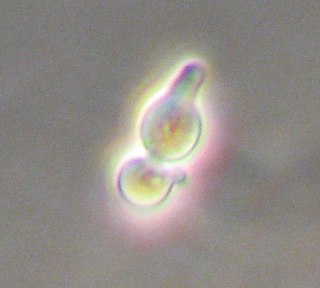
The mating of yeast, also known as yeast sexual reproduction, is a biological process that promotes genetic diversity and adaptation in yeast species. Yeast species, such as Saccharomyces cerevisiae, are single-celled eukaryotes that can exist as either haploid cells, which contain a single set of chromosomes, or diploid cells, which contain two sets of chromosomes. Haploid yeast cells come in two mating types, a and α, each producing specific pheromones to identify and interact with the opposite type, thus displaying simple sexual differentiation. A yeast cell's mating type is determined by a specific genetic locus known as MAT, which governs its mating behaviour. Haploid yeast can switch mating types through a form of genetic recombination, allowing them to change mating type as often as every cell cycle. When two haploid cells of opposite mating types encounter each other, they undergo a complex signaling process that leads to cell fusion and the formation of a diploid cell. Diploid cells can reproduce asexually, but under nutrient-limiting conditions, they undergo meiosis to produce new haploid spores.

Kim Ashley Nasmyth is an English geneticist, the Whitley Professor of Biochemistry at the University of Oxford, a Fellow of Trinity College, Oxford, former scientific director of the Research Institute of Molecular Pathology (IMP), and former head of the Department of Biochemistry, University of Oxford. He is best known for his work on the segregation of chromosomes during cell division.
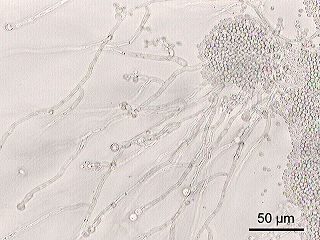
Saccharomycotina is a subdivision (subphylum) of the division (phylum) Ascomycota in the kingdom Fungi. It comprises most of the ascomycete yeasts. The members of Saccharomycotina reproduce by budding and they do not produce ascocarps.

The Dominican House of Studies is a Catholic institution in Washington, DC, housing both the Priory of the Immaculate Conception, a community of the Province of St. Joseph of the Order of Preachers (Dominicans), and the Pontifical Faculty of the Immaculate Conception, an ecclesiastical faculty of theology.
Saccharomyces pastorianus is a yeast used industrially for the production of lager beer, and was named in honour of Louis Pasteur by the German Max Reess in 1870. This yeast's complicated genome appears to be the result of hybridisation between two pure species in the Saccharomyces species complex, a factor that led to difficulty in establishing a proper taxonomy of the species.
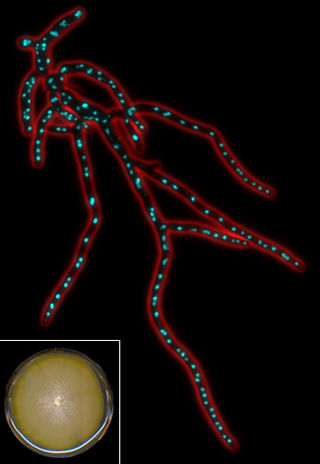
Eremothecium gossypii (also known as Ashbya gossypii) is a filamentous fungus or mold closely related to yeast, but growing exclusively in a filamentous way. It was originally isolated from cotton as a pathogen causing stigmatomycosis by Ashby and Nowell in 1926. This disease affects the development of hair cells in cotton bolls and can be transmitted to citrus fruits, which thereupon dry out and collapse (dry rot disease). In the first part of the 20th century, E. gossypii and two other fungi causing stigmatomycosis (Eremothecium coryli, Aureobasidium pullulans) made it virtually impossible to grow cotton in certain regions of the subtropics, causing severe economical losses. Control of the spore-transmitting insects - cotton stainer (Dysdercus suturellus) and Antestiopsis (antestia bugs) - permitted full eradication of infections. E. gossypii was recognized as a natural overproducer of riboflavin (vitamin B2), which protects its spores against ultraviolet light. This made it an interesting organism for industries, where genetically modified strains are still used to produce this vitamin.
Brian K. Kennedy is a scientist, performing research on the science of aging and healthy longevity. Since 2017, he has served as a Distinguished Professor in Biochemistry and Physiology at the Yong Loo Lin School of Medicine in the National University of Singapore, where he is currently the Director of the Healthy Longevity Translational Research Programme and the Asian Centre for Reproductive Longevity and Equality. His efforts have been directed at building world-class longevity research in Singapore.
John C. Vidmar, O.P. is an associate professor of history at Providence College, Rhode Island where he also serves as provincial archivist and teaches history. Prior to his work at Providence, he served as associate professor, academic dean, acting president and prior teaching history for 15 years at the Dominican House of Studies in Washington D.C.
G1/S-specific cyclin Cln3 is a protein that is encoded by the CLN3 gene. The Cln3 protein is a budding yeast G1 cyclin that controls the timing of Start, the point of commitment to a mitotic cell cycle. It is an upstream regulator of the other G1 cyclins, and it is thought to be the key regulator linking cell growth to cell cycle progression. It is a 65 kD, unstable protein; like other cyclins, it functions by binding and activating cyclin-dependent kinase (CDK).
Saccharomyces eubayanus, a cryotolerant type of yeast, is most likely the parent of the lager brewing yeast, Saccharomyces pastorianus.
Saccharomyces kudriavzevii, is a species of yeast in the Saccharomyces sensu stricto complex. Its type strain is NCYC 2889T. It is used in production of alcoholic beverages, including pinot noir wine, and hybrids of it are used in beer brewing. It is isolated widely from the bark of oak trees.

Fred Marshall Winston is the John Emory Andrus Professor of Genetics in the Harvard Medical School Genetics Department, where he has been a member of the faculty since 1983. Research in his laboratory has focused on mechanisms of transcription and the regulation of chromatin structure in the budding yeast Saccharomyces cerevisiae and the fission yeast Schizosaccharomyces pombe. Dr. Winston served as the President of the Genetics Society of America in 2009 and has been elected to both the American Academy of Arts and Sciences (2009) and the National Academy of Sciences (2013).
Aerobic fermentation or aerobic glycolysis is a metabolic process by which cells metabolize sugars via fermentation in the presence of oxygen and occurs through the repression of normal respiratory metabolism. Preference of aerobic fermentation over aerobic respiration is referred to as the Crabtree effect in yeast, and is part of the Warburg effect in tumor cells. While aerobic fermentation does not produce adenosine triphosphate (ATP) in high yield, it allows proliferating cells to convert nutrients such as glucose and glutamine more efficiently into biomass by avoiding unnecessary catabolic oxidation of such nutrients into carbon dioxide, preserving carbon-carbon bonds and promoting anabolism.
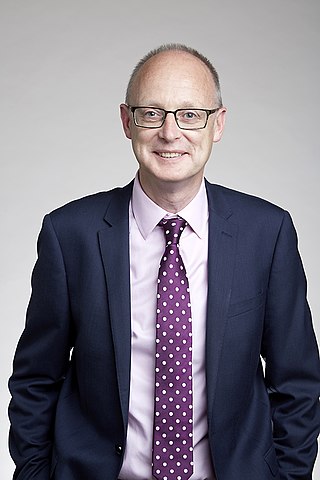
Kenneth Henry Wolfe is an Irish geneticist and professor of genomic evolution at University College Dublin (UCD), Ireland.
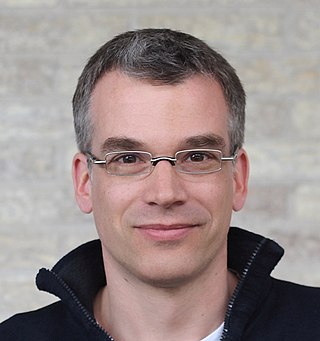
Matthias Heinemann is a professor of molecular systems biology at the University of Groningen. Heinemann leads an interdisciplinary lab of approximately 12 graduate students and post-doctoral scholars. Until 2019, he served as the chairman of the Groningen Biomolecular Sciences and Biotechnology Institute, was a board member of the Dutch Origins Center and the coordinator of EU ITN project MetaRNA. Heinemann is a member of the Faculty of 1000.

Joseph Heitman is an American physician-scientist focused on research in genetics, microbiology, and infectious diseases. He is the James B. Duke Professor and Chair of the Department of Molecular Genetics and Microbiology at Duke University School of Medicine.

Bernard Dujon is a French geneticist, born on August 8, 1947, in Meudon (Hauts-de-Seine). He is Professor Emeritus at Sorbonne University and the Institut Pasteur since 2015. He is a member of the French Academy of sciences.
Lorraine S. Symington is a British-American geneticist. As the Harold S. Ginsberg Professor and Director of Graduate Studies of Microbiology & Immunology at Columbia University, her laboratory uses genetic, biochemical and molecular approaches to understand mechanisms of homology-directed double-strand break repair using the yeast Saccharomyces cerevisiae as an experimental system.












